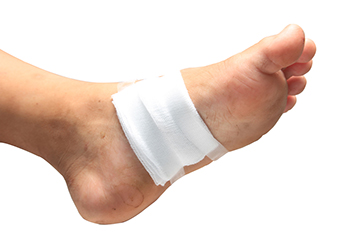
Recurring diabetic foot ulcers are a common issue for individuals with diabetes, often caused by poor blood flow and prolonged pressure on certain areas of the foot. These factors impair the ability to feel pain and delay healing, making it difficult to detect injuries early and increasing the risk of repeated wounds. Wearing tight or ill-fitting shoes, unaddressed foot deformities, and inadequate foot care can also contribute. Preventing recurrence starts with managing blood sugar levels to enhance healing and circulation. Regular foot inspections, wearing diabetic-friendly footwear, and keeping the skin clean and moisturized are essential. Proper offloading techniques, such as custom orthotics or specialized insoles, can reduce pressure on vulnerable areas. If you have recurring diabetic foot ulcers, it is suggested that you consult a podiatrist who can create a tailored treatment and prevention plan.
Wound care is an important part in dealing with diabetes. If you have diabetes and a foot wound or would like more information about wound care for diabetics, consult with one of our podiatrists from The Foot Specialists. Our doctors will assess your condition and provide you with quality foot and ankle treatment.
What Is Wound Care?
Wound care is the practice of taking proper care of a wound. This can range from the smallest to the largest of wounds. While everyone can benefit from proper wound care, it is much more important for diabetics. Diabetics often suffer from poor blood circulation which causes wounds to heal much slower than they would in a non-diabetic.
What Is the Importance of Wound Care?
While it may not seem apparent with small ulcers on the foot, for diabetics, any size ulcer can become infected. Diabetics often also suffer from neuropathy, or nerve loss. This means they might not even feel when they have an ulcer on their foot. If the wound becomes severely infected, amputation may be necessary. Therefore, it is of the upmost importance to properly care for any and all foot wounds.
How to Care for Wounds
The best way to care for foot wounds is to prevent them. For diabetics, this means daily inspections of the feet for any signs of abnormalities or ulcers. It is also recommended to see a podiatrist several times a year for a foot inspection. If you do have an ulcer, run the wound under water to clear dirt from the wound; then apply antibiotic ointment to the wound and cover with a bandage. Bandages should be changed daily and keeping pressure off the wound is smart. It is advised to see a podiatrist, who can keep an eye on it.
If you have any questions, please feel free to contact our offices located in Waltham and Milford, MA . We offer the newest diagnostic and treatment technologies for all your foot care needs.
